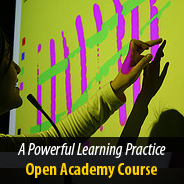From our observations of classes taught in our school and presentations given during faculty meeting, our group felt that we were seeing presentation software used in a way that sometimes inhibited the interactive nature of an effective content-driven presentation. While we could have focused our efforts on improving our faculty’s use of one particular software tool, we instead broadened our scope by thinking about increasing collaboration and engagement during lessons or presentations that are mainly content-driven.
Objectives:
- establish baseline data (through survey of students) about how often collaborative or interactive activities occur in our classes
- act as resources for teachers to help them transform lessons to make them more student-centered
- increase the level of student interaction in our courses
Assessment:
- hold a voluntary workshop for teachers to help share what we’ve learned and exchange ideas with other teachers
- in our informal conversations with other faculty members, encourage teachers to continue their learning about 21st century teaching and learning
- re-assess student perceptions of their classes by resending the survey next spring, look for significant changes
September 2010 – January 2011: PLP team explores Web 2.0 tool
January 2011 – March 2011: PLP team re-works our own lessons and tests them in the classroom
April 2011: Baseline survey of students sent and received, presentation made to faculty meetin
May 2011: Voluntary workshop for faculty members (5 people in attendance
September 2011 – April 2012: Continue to speak for faculty members informally, perhaps hold occasional workshop
April 2012: Re-assess student perceptions of the degree of interaction in their classes by sending out the same survey
After this year’s experience, we are realizing that time can often be the deciding factor in determining whether teachers will be willing to actively seek out new teaching methods in our busy boarding school community. Our attendance level for our workshop was low, and our survey results were met with some opposition during faculty meeting. Overall, we have heard more positive feedback from faculty members than negative feedback, and faculty members are interested in learning more about what we’ve been doing. Sharing a specific, attention-grabbing and effective lesson that we’ve done seems to be the surest way of sparking our colleagues interest and moving forward with the collaborative learning process. While our attendance at the voluntary workshop was fairly low, we know from experience that we have acheived higher attendance rates (about 15 people out of 70) when workshops have been presented that are time-relevant and highly practical (learning how to use our LMS gradebook at the beginning of the year, for example). Next year, we hope to continue our work in an informal fashion since it has been difficult to keep up with the pace of the project without release time.
Learn more about our project and download files and artifacts by visiting
our project website.


